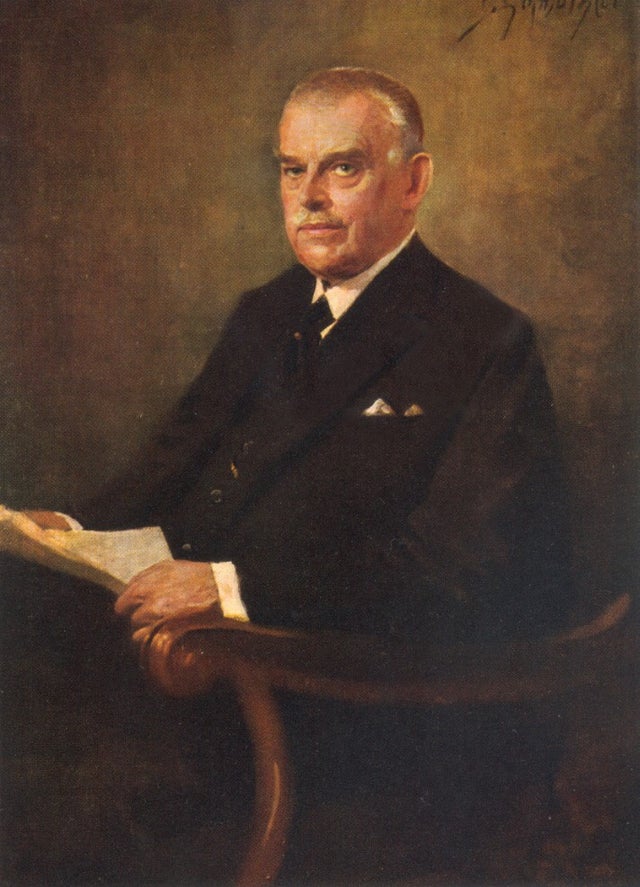A seismic shift: The First World War and the Great Depression (1914–1933)
properties.trackTitle
properties.trackSubtitle
The outbreak of WWI ends a period of almost entirely unbroken growth for Munich Re. Large parts of its foreign business are lost, as the warring nations also regard the war as an economic conflict and prohibit trade with enemy states. Countless reinsurance treaties are annulled, and foreign subsidiaries are closed down.
After the war, the Treaty of Versailles restricts international business activities. The situation slowly stabilises by the mid-1920s, until turbulence returns with the Great Depression. Thanks to its conservative investment strategy, Munich Re survives the crisis years without incurring large losses.
1914 – Outbreak of the First World War
Already in the first year of the war, the United Kingdom and France pass laws that prohibit trade with enemy states. Premium income in the financial year 1914–1915 initially takes a tumble. Despite this and other restrictions on trade, during the war Munich Re succeeds in maintaining business relations with its partners abroad via its international network.
1916 – Life insurance for all
Life insurance has so far been reserved for those who are in good health. A department dealing with “substandard” risks is set up in 1916. Munich Re hires its first health professional, and builds up expertise that will later be in high demand both in Germany and elsewhere.
1916 – The Bergen fire
In January 1916, fire destroys large parts of the Norwegian town of Bergen. As the leading reinsurer in neutral Norway, Munich Re suffers a loss of 3.5 million Norwegian kroner (or 5.25 million marks) and is one of the first to pay out claims. As claims have to be made in foreign currencies, Munich Re also uses its US assets.
1917 – The United States enters the war
When the United States enters the war, the assets of German companies in the USA are seized. First Re, Munich Re's subsidiary in the USA that was founded in 1912, has to close down its business and its assets are seized and taken into enemy property administration.
1917 – Founding of Hermes
On 7 October, credit insurer Hermes is founded in Berlin by Munich Re, its affiliate Globus and the Kompass Kreditversicherungs-Bank (part of the Phönix insurance group). Munich Re holds 50% of the shares.
1919 – First cover available for aviation risks
In the spring of 1919, Munich Re insures aviation risks for the first time. It offers aviation accident and aviation liability reinsurance cover for a Swedish company.
1919 – Treaty of Versailles
The Treaty of Versailles marks the end of WWI. In accordance with the Treaty's provisions, German assets in the territories of its former enemies are seized. Contracts between German insurers and insurers from the Allied countries are annulled. Access to markets in Russia, France, the United Kingdom and the USA is closed off for German companies for some years.

Carl von Thieme moves to the Supervisory Board in 1922. His successor as Chair of the Board of Management is Wilhelm Kißkalt, who leads the Company until 1937.
1922–1923 – Hyperinflation sets in
When a major fire destroys the Goetheanum in Dornach near Basel at New Year 1922–1923, Munich Re begins to feel the first effects of hyperinflation in Germany. It has covered part of the risk, and the retrocessions are denominated in marks. The payments Munich Re receives in marks from retrocessionaires have devalued, but Munich Re has to pay out the claims in Swiss francs.
1923 – Founding of Union Rück in Zurich
In March 1923, the USA releases some of the assets it confiscated in 1917. Wilhelm Kißkalt plans to make a direct investment in Switzerland – which has a hard currency – so that the funds are not immediately decimated by hyperinflation. The new subsidiary, Union Rückversicherungs-Gesellschaft, is founded in Zurich on 2 May 1923.
1927 – Return to France
A trade agreement is signed between France and Germany for the first time since the end of the war. Munich Re is granted a licence and opens an office in Paris. Munich Re's foreign business is slowly restored via investments in various companies.
1929 – Wall Street crash and the Great Depression
The Great Depression sparked by the Wall Street crash of 29 October 1929 shatters the capital markets and leads to a banking crisis in Germany in 1931. Many insurers report losses that threaten their existence. Thanks to its conservative investment strategy, Munich Re survives the depression without large losses. Over 60% of the investment portfolio comprises fixed-interest securities.